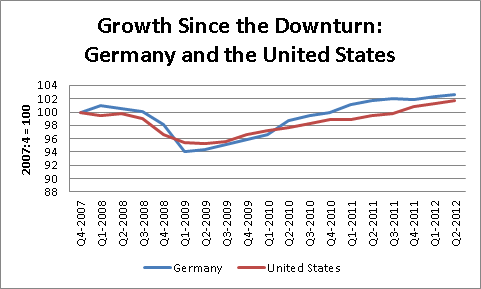September 25, 2012
The NYT had an article that reported on Germany’s relative economic success and attributed it to the labor market reforms that reduced benefits for unemployed workers and took other steps to weaken workers’ bargaining power. While these reforms undoubtedly had the effect of reducing Germany’s labor costs and thereby allowing it to accumulate a large trade surplus in the euro zone (which meant that countries like Greece, Spain, and Ireland would have large trade deficits), this is only part of the story of Germany’s success in lowering its unemployment rate.
The fact that Germany has persuaded employers to reduce work hours rather than lay off workers has been at least as important in bringing down Germany’s unemployment rate. Germany’s growth rate since the downturn began has been almost identical to the growth rate in the United States. While the unemployment rate in the United States has risen by 3.6 percentage points over this period, from 4.5 percent to 8.1 percent, the unemployment rate in Germany has fallen by more than 2.0 percentage points from the 7.6 percent to 5.5 percent. It would have been worth noting the policy of promoting work sharing in this discussion.
 Source: OECD.
Source: OECD.
The NYT article also wrongly refers to the official Germany unemployment rate of 7.0 percent instead of the OECD harmonized rate. The official German rate counts people who are working part-time but desire full-time employment as being unemployed. It therefore is not directly comparable to the U.S. unemployment rate. The OECD harmonized unemployment rate uses the same methodology as the U.S. Labor Department.







Comments